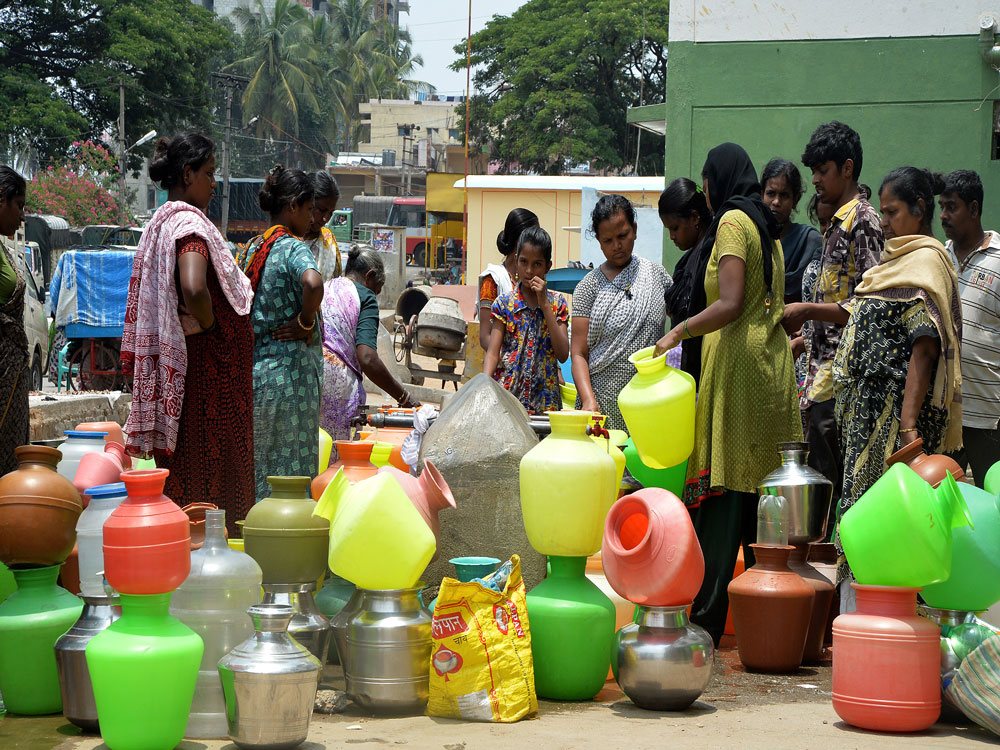Bangalore’s water
March 10, 2018 | Expert Insights

Bangalore, a city in southern India, suffers from acute water stress. However, officials have dismissed claims that Bangalore is set to be the “next Cape Town”, claiming that the city has sufficient supplies to last until 2031.
Background
The world today faces a crisis of water availability. Only 1% of all fresh water in the world is freely available for use. According to the World Resources Institute, more than a billion people in the world live in water scarce regions, and approximately 3.5 billion could be living with water scarcity by 2025. The World Health Organisation estimates that 850 million people don’t have access to safe drinking water. As freshwater reserves are drained, sea levels continue to rise at an estimated 3.2 millimetres a year.
According to the World Bank, in 2014 the world on average withdrew a total of 9.2% of its internal freshwater resources: almost 4,000 billion cubic metres. To put this in context, the total global renewable freshwater resources in 2014 were approximately 43,000 billion cubic metres. Some experts speculate that by 2030, the global demand for fresh water will exceed the supply by 40%. This demand is primarily for agriculture and food production.
Early this year, it was announced that Cape Town in South Africa will become the first city in the world to run out of fresh water. It was estimated that the city would reach “Day Zero” by May 11th, however the government has managed to push this date until 2019.
India holds 4% of the world’s freshwater, but houses 16% of the global population. According to the Central Water Commission, rivers are a key source of freshwater in the subcontinent, for domestic, agricultural, and industrial use.
The city of Bangalore in southern India was recently on a list published by the BBC - of the most water-stressed cities in the world. There has been growing concern that Bangalore will be next on the list of cities to run out of fresh water. Bangalore is home to close to 11 million people, and is known as India’s Silicon Valley.
Analysis
According to media reports, residents in parts of Bangalore began to experience water shortage as early as February this year. Water shortage is usually linked to dry summer months. Historically, the city has been reliant on the Arkavathi river basin for its supplies. Hesaraghatta Lake and the Thippagondanahalli Reservoir were both key sources of water for the city. Today, these reservoirs are severely depleted.
Additionally, the city faces infrastructural shortcomings such as old pipes and colonial-era plumbing. This leads to the contamination of water. Bangalore’s lakes and ponds also face critically high levels of pollution. 85% of surface water in Bangalore is too toxic for human use.
Bangalore’s primary source of water today is thus the Cauvery River. In 2013, officials diverted an extra 10,000 million cubic feet from the river to the city in order to keep up with its expanding needs. Officials have stated that the city is also currently undertaking a project titled “Cauvery Water Supply Stage Five”, which is funded by the Japanese International Cooperation Agency. This will reportedly provide Bangalore with an excess of “a little more than 50% of its current supply”, according to the BBC.
In February 2018, the Supreme Court ruled in favour of the state of Karnataka in a long-standing dispute between the states of Tamil Nadu and Karnataka, regarding sharing of water from the Cauvery River. Part of this ruling allocates a higher share of river water to Bangalore, addressing the issue of drinking water in the city.
"Yes, we will face some water stress until 2023. But we certainly are not facing a crisis, because we are augmenting the supply," the chairman of the water supply board, Tushar Girinath, told the BBC. However, critics have said that this model is highly unsustainable. A drought in the Cauvery basin would hit the city hard. The widespread use of borewells has resulted in rapidly depleting groundwater reserves with little replenishment. Due to this exploitation of groundwater, the reserves have also deteriorated in quality.
Experts have repeatedly recommended for rainfall to be harvested, and officials have encouraged communities to construct their own water treatment plants. However, most programs for rainwater harvesting have seen a dismal response thus far.
Assessment
Our assessment is that a mismanagement of resources, combined with the growing uncertainty of the hydrological cycle due to climate change, has resulted in a water crisis. As Bangalore makes arrangements to meet its needs for the next decade, the city must work towards long term sustainability by improving consumption, and sustainability patterns. We believe that the city must diversify its sources of water and address a number of systemic failings.








Comments